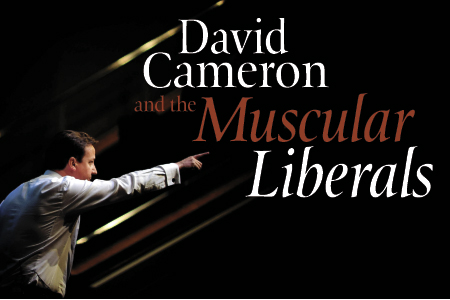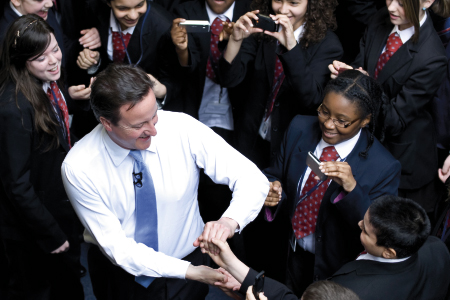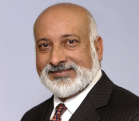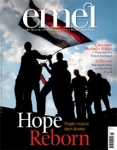
David Cameron and Muscular Liberals
Issue 78 March 2011
The prime minister sent a powerful message to Muslims about their future in Britain. Mahmud Al-Rashid reflects over the implications.
I listened to the prime minister’s speech in my car on the 19th anniversary of my father’s death. I had hoped for better from Mr Cameron, instead he verbally assaulted many of us. He desecrated the memory of Muslims who had contributed to Britain; he singled out a largely powerless minority group that is constantly demonised; he conflated terrorism with cultural identity. His failure to understand the context, the history, the nuances was depressing. But for me, the major failure of the prime minister in Munich was the missed opportunity: here was a chance, with world leaders in attendance, to articulate a new vision, not just for Britain but Europe too; one that would have inspired all of us to feel “we’re in it together.”
Short of forced expulsion, Britain’s citizens are the colour and religion they are. The prime minister should have used this fact of diversity to expound an inclusivist vision of community and citizenship—not countered on security, terrorism and extremism, but founded on hope, justice and equality. He could have sent a message that would have harnessed the energy and dynamism of young Muslims who really want to serve their society. Instead, he played mood music to the EDL march against Muslims in Luton; in return, they hailed him as one of their own, as did Marine Le Pen in France. This was Cameron’s chance to provide enlightened leadership; instead, like Sarkozy over the niqab ban, he diminished his own stature. There was a different Cameron—pre-election, when he celebrated Muslims as an asset, denounced the term ‘Islamism’ and declared that, “We cannot bully people into feeling British.” Since then, the whisperings of the neo-cons have re-aligned his sentiments.

I had a lot of sympathy for large parts of his speech. There is a genuine threat of terrorism, and Muslims have absolutely no justification to engage in such acts. There are worrying issues with identity and cultural practices, and Muslims have an urgent need to deal with these problems. We must expedite our synthesis of an indigenous Islam, and double our efforts to reassure people Islam is a force for the common good. But, the prime minister’s sliding spectrum is dangerous and misleading. There is no credible link between forced marriage and terrorism. The issues are much more complex; after all, the 7/7 bombers were models of integration— ‘home grown’, were they not?
“Islam is a religion observed peacefully and devoutly, and Islamist extremism is a political ideology,” said the prime minister. This strict division is misconceived and attempts to isolate Islam from the public arena. What Mr Cameron fails to understand is that political expressions by devout Muslims are predicated on moral and religious foundations. When the Qur’an claims, “Successful is the one who purifies his soul,” that is a profoundly religious instruction. When the same Qur’an warns, “Woe unto the pious believer who prays, but fails to care for the orphan or feed the poor,” and when the Prophet Muhammad declared, “the greatest act of jihad is to speak truth to power,” these are manifestly political imperatives. None of this should be strange to a Christian man like Cameron. In the Bible, he will note the story of Jesus smashing the tables of the moneylenders – this was a highly political action. If he looks to William Wilberforce, he will see a politician motivated by his Christian beliefs to campaign against slavery. In Lord Atkin he will see a judge who founded the modern law of Negligence on Christian principles of loving one’s neighbour. He should not deny devout Muslims who are similarly inspired a place in public life.
The prime minister accepts that poverty, western foreign policy and the lack of democracy in Muslim countries are “contributory factors” to British terrorism, but the root cause he says is the ‘Islamist ideology’. That is not borne out by facts. There are terrorists all over the world who are not Muslims and have nothing to do with Islam. Anyone can misappropriate text to justify violence. Tony Blair used UN Resolution 1441 to unleash war against Iraq; the Dutch Reform Church gave religious sanction to the Apartheid regime; Jews have used Biblical references for territorial expansion and ethnic cleansing; Christians in the US kill people in abortion clinics; Hindus in India have massacred Muslims and desecrated mosques, and so with Muslims too: justifying the unjustifiable using religious texts. The “root problem” is not the ‘Islamist ideology’, Mr Cameron; it is actually a human problem—a long-standing and widespread one.
With his demand that “Muslims must embrace British values,” the prime minister needs to be less strident. He himself has called Britain a “broken society” and the evidence of social decay supports his contention. Replacing ‘state multiculturalism’—if there ever was such a policy—with an enforced, state-sanctioned, mono-culture is dangerous social engineering, and European countries need to be wary of treading that path again.
By now, the prime minister should understand Islam is not a racial identity. Indeed, there is a sizeable community of ‘white’ Muslims, whose numbers are increasing. What lessons should they take from Mr Cameron about the British way of life? And what would he say to the ‘white’ Muslims convicted of terrorism? They were born into British values. There is an unpalatable taste to today’s ‘British way of life’ and it is deceitful to coerce people to sign up to it. He rightly says our collective identity is weak; but we have no great narrative to bind us all. The traditional unifying forces of society are ineffective today. He was negligent to ignore the corrosive and fragmenting impact of decades of unrestrained capitalism and corporate greed. Trust has disappeared. Ten years ago, I heard philosopher Onora O’Neill warn of the consequences of the loss of trust in our institutions and professions. The situation does not bode well for rebuilding our collective identity.
The prime minister wants to control access to grass-root Muslim organisations. This is at odds with his idea of the Big Society and would exclude many Muslims from his desire to build “stronger societies and stronger identities”. Many Muslim organisations have been at the vanguard of religious enlightenment and social integration. In branding which Muslims his government will favour and which ones he will reject, Cameron’s Big Society sounds more like Big Brother. He talks of Muslim organisations that are “showered with public money.” It may be that the Radical Middle Way and the Quilliam Foundation have received millions from the government, but is he saying they are now part of the problem? He spoke of banning preachers of hate, but an American, Rabbi Nachum Shifren, was allowed preach hate at an EDL protest in London. “Muslims need to be treated like the dogs they are,” Shifren bellowed without any fear.
Irrational and gratuitous attacks upon Muslims are endemic. This is painful because I have loved Britain, more than any other country. I have lived here most of my life, and I do not want to emigrate. It is my country too. My parents died in England, and they are buried here—their flesh and bones have assimilated with the English soil. My son goes to school here—100 yards across the road from the prime minister’s dispatch box in Parliament; 100 yards from the judges of the Supreme Court; and only 50 yards from the Abbey, where the Kings and Queens of England are buried. I have aspirations for him, just as my father did for me as the two of us stood outside the wrought iron gates of Loughborough Grammar School, but got no further as neither of us spoke any English. Britain should be a country where someone of my background can aspire for his child to stand where the prime minister does or sit where the judges do, and still draw from their religious heritage. But I fear Mr Cameron’s new muscular Britain could possibly end up like Steinbeck’s Lennie, who only succeeded in destroying the very thing he wanted to protect.
Calls for a Muscular Cohesion
The prime minister’s speech at the Munich Security Conference sparked a national debate, with the Shadow Justice Secretary accusing David Cameron of “writing propoganda” for the EDL. Politicians, broadcasters and commentators mused over multiculturalism; have we failed in our attempts to build a cohesive, tolerant community? Have we dismissed the importance of integration altogether and become fragments of society; forming isolated, inaccessible ghettos? Have we failed to form a British identity? We hear from three prominent British Muslims, all engaged in grassroots work, on their reaction to Cameron’s speech.

Saleem Kidwai
Wales
Secretary General of the Muslim Council of Wales
Humanity was not designed to be homogenous, and policies of assimilation have often stoked division and discord such as in France. A strong society should be one in which differences are respected instead of suppressed, and shared identities are celebrated instead of enforced. We in Wales are very proud of our working relationship not only with the Welsh Assembly Government but also with all the faith communities, TUC, universities, schools and colleges and the police. In Wales, we think and work as WE not US and THEM. WE have to work in partnership. It is our country; to make prosperous, progressive and peaceful. WE may have different opinions and views but the bottom line is what is good for our country. There is no contradiction in values. Cut out the blame culture, be positive, think as WE.

Farkhanda Chaudhry
Scotland
Trainer in religious diversity and anti-discrimination
I find some of the PM’s ideas run counter to a liberal society. Some Muslim youth will inevitably ask questions around identity and belonging, but research on the subject in Scotland suggests that for many young Muslims, ‘Scottishness’ is a strong part of their identity. They are proud Scots, but like a lot of Scots, not so keen on the notion of Britishness.
The government should proactively build good links with a range of organisations and groups, like the Scottish government which is closer to the voluntary sector and makes great efforts to build relationships across different faiths and cultures. We must ensure we address issues of poverty, oppression and injustice and engender a sense of collective belonging to shared spaces within which we embrace diversity of views and cultures.

Julie Siddiqui
England
Executive Director of Islamic Society of Britain
There are aspects of the PM’s speech which resonate with many of us as there are issues at a community level which need to be tackled head on, and I think there needs to be more Muslim intra-community dialogue about issues such as forced marriage, identity, citizenship and more. However, whilst these issues do affect small sections of our community who have linked culture and a misinterpretation of the faith, why does Cameron have to link all of that to a failing of multiculturalism and then make a link to extremism and terrorism? Such sweeping statements give fuel to far right rhetoric and will inevitably alienate whole groups of people even further. We hear a lot of rhetoric over Muslim loyalty to this country. I wonder why that even needs to come into question. For me, and for the majority of Muslims, loyalty and affiliation to Britain is a given.
What is really been done about ‘organisations’ like the English Defence League? I would argue, very little. We respond if they put together a rally, but that’s reactive. Whilst we have to listen to the grievances of the EDL we have to keep them in context. We must openly condemn and robustly deal with what has now become openly anti-Muslim sentiment which is already leading to violence and hatred on a scale that we cannot afford to ignore.
There is no doubt that education and a general bringing together of people of all backgrounds, cultures and faiths is the answer, but there also has to be a more fair and honest look at some of the deep rooted issues of our time.
PHOTOGRAPHY ANDREW PARSONS & CONSERVATIVE PARTY
Bookmark this |
|
Add to DIGG |
|
Add to del.icio.us |
|
Stumble this |
|
Share on Facebook |
|
Share this |
|
Send to a Friend |
|
Link to this |
|
Printer Friendly |
|
Print in plain text |
|


Comments
2 Comments
1
ABD
24 Feb 11, 17:30
This was an excellent piece--intelligent, nuanced and
forward-looking. We here in America should be looking
to the British Muslim community for guidance on how
to navigate life as persons of faith in a plural society.
2
Ifti
24 Feb 11, 17:05
The British expat community in siuthern Spain don't learn Spanish (even after living here 20 years), don't mix with the Spainsh, go to English bars and restaurants and generally "live separate lives" from the locals. They don't like it when it happens in England. I consider it gross hypocrisy to suggest that muslims must integrate into UK society but Brits don't need to integrate into
Spanish society.
According to a recent Canadian research, speaking a second language increases"brain power. Learning a language as a child, physically changed the brain and made some areas larger, powerful and flexible and thereforewere resistent to damage. British schooling has committed a crime against humanity to make bilingual Muslim children as notoriously monolingual Brits. Monolingual non-Muslim teachers are not role models for bilingual Muslim children during their developmental periods.
IA
http://www.londonschoolofislamics.org.uk